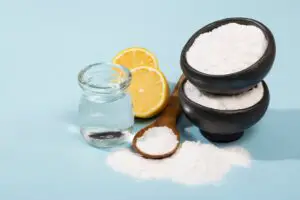Fiji Water, often touted as the “Earth’s Finest Water,” has become increasingly popular among health-conscious consumers. With its natural artesian origins from the Fiji Islands, this bottled water is believed to offer various benefits such as hydration, skin health, and electrolyte balance.
The absence of artificial compounds is one reason enthusiasts consider Fiji water superior to regular water. However, the question arises: is Fiji water genuinely good for you, or is it just a product of marketing hype?
Many people praise the taste of Fiji Water, as it is naturally filtered through volcanic rock, giving it a unique and refreshing flavour. The water’s wide availability and convenient packaging make it an appealing option for on-the-go hydration.
While the health benefits may seem promising, it’s essential to consider whether the advantages outweigh the environmental impact and cost. Moreover, it is crucial to look at the scientific evidence supporting the claims of Fiji water’s health benefits. In the following sections, we will delve into various aspects of Fiji water, weighing its pros and cons to determine if it’s truly good for you.
What is Fiji Water
Fiji Water is a popular brand of bottled water sourced from an aquifer deep beneath the pristine Yaqara Valley of Viti Levu in Fiji. The water is said to come from an underground reservoir, providing natural artesian water, untouched by human intervention. This pure water from the beautiful island of Fiji has gained considerable attention among health-conscious individuals due to its potential benefits and unique properties.
Fiji Water comes from Viti Levu, the largest island in the Fiji archipelago, and the Yaqara Valley is home to this untouched, natural source. The water undergoes a natural filtration process through volcanic rock, which helps to purify it and gives it a distinct mineral composition.
This artesian water is obtained from the depths of the earth, ensuring that it is free from pollutants and other contaminants commonly found in surface water sources.
Artesian water, such as Fiji Water, is characterised by originating from a confined underground aquifer under pressure. This pressure forces the water upwards towards the surface, where it eventually flows out of the well or spring. The unique geological conditions that create artesian water systems often result in water with a distinct taste and mineral profile, which many believe to be beneficial for health.
Fiji Water is bottled at its source, ensuring that the water remains pure and is not exposed to pollution or other contaminants during transportation. The company is committed to maintaining the natural purity of its water, and extensive testing is conducted to ensure the water’s consistent quality and taste.
In summary, Fiji Water is unique due to its origins in the pristine Yaqara Valley of Viti Levu, the process in which it is naturally filtered through volcanic rock, and the artesian nature of the water itself.
Health Benefits of Fiji Water
Hydration and Electrolytes
Fiji Water is known for its ability to support hydration by providing essential electrolytes such as sodium, potassium, magnesium, and calcium. Staying properly hydrated is crucial for regulating body temperature, preventing dehydration, and supporting healthy digestion.
Fiji Water, with its naturally occurring electrolytes, can help maintain a balance of these important minerals in the body, thus contributing to overall health and well-being.
Mineral Content
Besides the essential electrolytes, Fiji Water also boasts a unique mineral profile, which includes a high amount of silica. Silica is known to have various health benefits, including promoting skin and bone health.
Additionally, the presence of minerals like sodium, potassium, magnesium, and calcium in Fiji Water makes it a good source of these beneficial nutrients that are important for maintaining the proper functioning of the body.
Skin and Bone Health
As mentioned earlier, the silica content in Fiji Water can contribute to better skin and bone health. Silica is known to promote collagen production, leading to better skin elasticity and a visible glow. For bone health, silica plays a vital role in the formation and maintenance of bone tissue, which helps to reduce the risk of fractures and improve overall bone strength.
In conclusion, Fiji Water, with its unique mineral profile and electrolyte balance, can offer numerous potential health benefits, including proper hydration, mineral intake, and skin and bone health. However, it is important to remember that water alone is not a substitute for a balanced diet, and one should always consult with a healthcare professional for specific dietary advice.
Cons of Fiji Water
Environmental Impact
One of the significant drawbacks of Fiji Water is its environmental impact. The production and transportation of bottled water result in a considerable carbon footprint. Due to the remote location of Fiji’s water source, the water must be transported over long distances, causing additional greenhouse gas emissions.
Furthermore, the extraction and processing of the raw materials needed for the production of Fiji Water can lead to environmental degradation in the region.
Plastic Bottle Issues
Another downside of Fiji Water is the plastic bottles that it comes in. The use of plastic bottles contributes to the growing problem of plastic waste, especially since many of these bottles end up in landfills or oceans instead of being recycled.
In addition to the environmental concerns related to plastic waste, there’s also the issue of PET (polyethylene terephthalate) used in the bottles. PET can potentially leach harmful chemicals into the water, especially when exposed to heat or sunlight for an extended period.
To sum up, while Fiji Water may have some advantages in terms of taste and mineral content, it is important to consider the environmental impact and plastic bottle issues associated with consuming this particular brand of bottled water.
Safety of Fiji Water
Fiji Water is known for its natural, contaminant-free characteristics, which make it a popular choice among bottled water enthusiasts. The safety standards of Fiji Water are governed by regulations set forth by the US Food and Drug Administration (FDA), ensuring that it adheres to strict quality control measures. This includes ensuring the appropriate levels of minerals and the absence of harmful impurities such as arsenic, fluoride, and chloride.
The mineral content of Fiji Water is higher compared to other regular bottled waters. These minerals include calcium, magnesium, and potassium, which are essential for maintaining good health. It is
Comparison with Other Bottled Water Brands
Evian
Evian is a popular bottled water brand sourced from the French Alps. Known for its unique taste, it is rich in minerals and has a neutral pH level, making it a good choice for hydration. Evian undergoes a natural filtering process through glacier-originated sands, ensuring its purity and maintaining its mineral content.
Dasani
Dasani is a purified bottled water brand produced by The Coca-Cola Company. The water is sourced from various locations and goes through a filtration process using reverse osmosis. This removes impurities and adds minerals back to create a clean and crisp taste. However, its taste might not be as unique as other brands like Evian and Voss.
Voss
Voss is a Norwegian bottled water brand known for its artesian origin and distinctive cylindrical glass bottle design. The water is sourced from a protected underground aquifer, ensuring it remains untainted by contaminants. One of the appealing factors of Voss water is its pure taste, which makes it a premium choice among bottled water enthusiasts.
Smartwater
Smartwater is a vapour-distilled bottled water brand, which means it goes through a process imitating the Earth’s natural water cycle. The water is vapourised, purified, and re-condensed, resulting in a clean and crisp taste. Smartwater also adds electrolytes for a subtle, distinctive taste. However, whether it is superior to other brands in terms of taste is subjective.
Aquafina
Aquafina is a purified bottled water brand produced by PepsiCo. The water goes through a rigorous purification process, including reverse osmosis and ultraviolet disinfection, to ensure a high level of purity. While Aquafina is known for its purity, it may not have the same unique taste profiles as brands like Evian or Voss.
In conclusion, this comparison highlights some of the key distinctions between top bottled water brands like Fiji water, Evian, Dasani, Voss, Smartwater, and Aquafina. Each brand has its unique features and taste profiles, and consumer preferences may vary depending on individual taste and priorities.
Understanding the Filtration Process of Fiji Water
Fiji Water originates from a natural artesian aquifer located in the remote Yaqara Valley of Viti Levu, in the heart of Fiji’s main island.
This artesian aquifer is a vital component of the Fiji Water filtration process, as the water is purified and filtered naturally through layers of volcanic rock. This filtration process removes impurities and contaminants, such as bacteria, viruses, and chemicals, resulting in a high level of purity and a clean, fresh taste.
The aquifer is fed by tropical rainfall that seeps underground after being purified by equatorial winds. As the water travels through the layers of volcanic rock, it collects minerals, such as silica, calcium, and magnesium, which contribute to the unique composition and health benefits of Fiji Water.
The filtration process is not only responsible for the water’s exceptional purity, but also its mineral content and natural electrolytes. These elements play an important role in maintaining good health and keeping the body hydrated over extended periods.
The natural source of Fiji Water ensures that it does not undergo human intervention prior to bottling, preserving its pristine state and quality. Moreover, the water is protected from exposure to environmental pollutants, leaving consumers with a truly pure and refreshing beverage.
In summary, the filtration process of Fiji Water can be attributed to its artesian aquifer and its journey through layers of volcanic rock. These natural processes result in a superior level of purity, making Fiji Water an excellent choice for those seeking a natural, high-quality source of hydration.
Nutritional Content of Fiji Water
Fiji Water is a popular choice for individuals who wish to stay hydrated and maintain a healthy lifestyle. Known for its purity and taste, Fiji Water contains several essential minerals that contribute to its overall nutritional value, without any added sugars or calories. Here is a brief breakdown of Fiji Water’s nutritional content.
Fiji Water contains essential minerals such as magnesium, potassium, calcium, and silica. For example, one litre of Fiji Water provides 14.7 milligrams of magnesium, 4.9 milligrams of potassium, 17.9 milligrams of calcium, and 93.4 milligrams of silica.
Magnesium is crucial for nerve function and bone health, while potassium helps maintain electrolyte balance and lower blood pressure. Calcium is essential for healthy bones and teeth, and silica offers additional support to connective tissues.
Furthermore, Fiji Water is well-regarded for its low sodium content, with merely 7 milligrams of sodium in a 500ml serving. This makes it an ideal choice for individuals who need to monitor their sodium intake and minimise the risk of high blood pressure or other related health issues.
As a pure source of hydration, Fiji Water is both calorie-free and sugar-free. A typical 500ml bottle contains 0 calories, 0 grams of total fat, 0 grams of total carbohydrates, and 0 grams of protein. This means that Fiji Water can easily fit into most diets and contribute to maintaining a healthy lifestyle without the added calories or sugars found in other beverages.
Moreover, Fiji Water is natural and contamination-free, making it a safe and healthy option for hydration. The higher mineral content compared to regular water adds to its unique taste and potential health benefits, such as improved blood circulation and skin appearance.
In summary, the nutritional content of Fiji Water makes it a beneficial component of a balanced and healthy diet. With essential minerals, low sodium levels, and no calories or sugars, Fiji Water provides individuals with a refreshing and nutritious choice for hydration.
My name is Ellis Francis and I have been a personal fitness trainer, sports nutritionalist and health and fitness advisor for over 25 years. I am the lead health and fitness advisor at https://awellnessbody.com.







